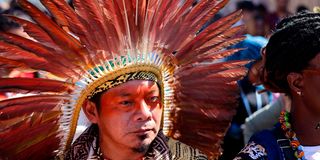Why everyone is fighting for attention in Sharm-el-Sheikh

President of the Federation of the Huni Kui People in Acre in Brazil Ninawa Inu Huni kui Pereira Nunes in Sharm el-Sheikh.
In Sharm-el-Sheikh
If COP27 being held in Sharm-el-Sheikh in Egypt is an arena of diverse – and mostly contrasting interests – it is also a melting pot of cultural displays from all over the world.
The two-week event here has brought together thousands of participants from the most notable countries of the world such as the United Kingdom and the least-known ones such as Turkmenistan alike. Remote small island states of Tuvalu and Niue too are represented.
Peruvian men donning giant ostrich feathers on their heads, Kenyan indigenous women glammed up in traditional regalia and beaded on nearly every surface and a group of youth demonstrators shouting about why the world should ‘‘go vegan’’ to an uninterested audience are some of the scenes you will be treated to.
The conference centre at this Egyptian resort city has featured an extravaganza of technical discussions on science, circuses and a silent fashion competition.
With the fashion and textile industries recently taking flak for pollution and greenwashing, there has been consciousness about climate change in the way participants dress at this meet-up.
Many arrived here clad in traditional costumes to flaunt their culture and identity. It is as easy to spot West African women in their dramatic Ankara-print headgear and scarves as it is to recognise Panamanian men with their large-brimmed papyrus hats.
It is only in serious sessions where formality has been witnessed, with the majority of delegates appearing in crisp suits and neckties. Even in these formal sessions, there have been notable exceptions, mostly among leaders from Arab world.
Kuwait’s Crown Prince Sheikh Ahmad and his Bahraini counterpart Salman bin Hamad came here dressed in their traditional gold-trimmed cloaks, adorned with a scarf. But like other world leaders, Egypt President Abdel Fattah El-Sisi has maintained a formal dresscode throughput, wearing either a navy blue or black suit over a bright shirt.
At this humongous gathering with so many dimensions, every voice fights to be heard. Media coverage is priceless. When one gets attention, they will try to outdo themselves.
Like one crafty and nearly shirtless guitarist who tugs at his instrument harder when a crowd starts to gather around him to record his performance. He entertains delegates outside the media centre, singing almost out-of-tune: “I love the Amazon. But there are more than 20 other Amazons in the ocean that we do not know about.” It leaves you wondering how he knew about them.
Then there is Frankie the Dino, the recreation of a dinosaur who has been entertaining – and scaring – delegates here. Not quite your usual showbiz, but serious warning on what humanity must do to avoid climate change-driven extinction.
‘‘I know a thing or two about extinction, and let me tell you…going extinct is a bad thing. And driving yourself extinct in 70 million years? That is the most ridiculous thing I have ever heard. At least we had an asteroid. What is your excuse?’’ warns Frankie, the so-called ‘‘sole survivor of the asteroid.’’
Others like Jennifer Kibon are here having flown for the first time ever in their life. Being here is a miracle for Kibon, who hails from Baringo County in Kenya. Her presence at COP27 is the incarnation of what is possible.
She told Nation she is in Sharm-el-Sheikh to represent women interests, her village and community. It is for this reason that Kibon proudly wears her traditional attire, with neck beads and dangling earrings.
“As a poor woman who can only afford one meal per day, I never imagined I would fly in my life. I have only seen jets fly above my village,” says she with an overspill of delight.
She was sponsored for this trip by Action Aid which runs empowerment programmes in her community.
While some entities are fighting for attention from the media, others are getting it without trying so hard. Groups of indigenous people from across the world have had journalists follow them around the facility, keen to hear their story. There are about 250 of them here, with about 70 of them from Latin America.
They came to COP27 as observers, and are now demanding to be negotiators at next year’s COP28 in Dubai. “We existed before the nation-states did. We have the right to be part of the debate,” says Gregorio Díaz Mirabal who is representing Peru’s Kurripaco community.
Protests are a COP staple. But here in Sharm-el-Sheikh, little activity in the way of demonstrations has been witnessed. Observers cite heavy-handedness by Egypt, whose human rights record has often raised eyebrows.
Still, some pockets of participants have been bold enough to hold mostly muffled demos in the periphery of the conference. Every day, the bear and rabbit mascots yell themselves hoarse, either calling for payment for loss and damage or decarbonisation of the world. Others are pleading with humanity to quit animal products (known for heavy carbon emissions).
All in all, these performances have broken the monotony of the usually formal negotiations and provided a relief from the tempest-tossed affair.




